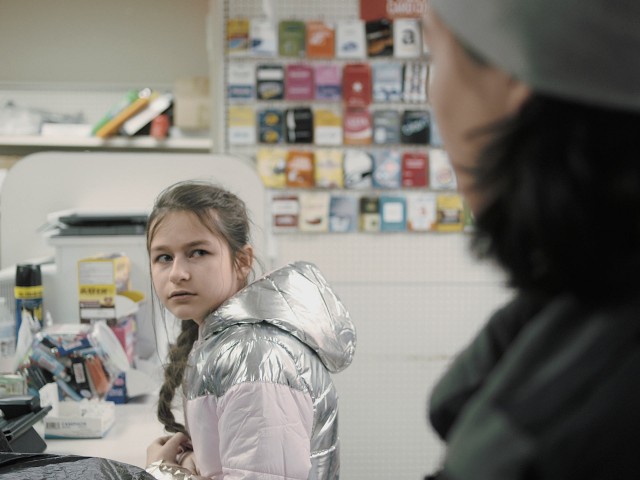One morning, after her breakfast plans are canceled at the last minute, June receives an unexpected visit from one of her students. The student, Lou, just got her period and doesn’t seem to have someone to help her through it. From this simple and awkward circumstance, writer/director Naomi Cubero paints a picture of womanhood via the bonding experience her two protagonists are about to share.
Perennial is one of those films that you should let wash over you. The narrative arc is not built around a key dramatic moment or a potent climax—the film is a slow-burn, carried by subtlety, the authenticity of the screenplay, and a compelling lead performance. To be able to successfully captivate the audience with such a simple premise is, of course, a testament to the filmmaking craft (and in terms of directorial vision the last shot is an emotional roller coaster) but first and foremost Perennial is a showcase for exquisite writing. Cubero pens a sensitive screenplay that depicts, with honesty, a new facet of a situation we’ve seen many times before.
Cubero explained to us that the film was born from her own reflection on what it means to “become a woman” and especially, as a trans person, the process of becoming an older sister. “As my younger siblings were approaching puberty, I grew increasingly anxious over guiding them through a teenage girlhood I never experienced”, she shared with us. Thus, Perennial has a very personal feel to it, and this is how Cubero built her storytelling. While Lou’s circumstance initiates the plot, their connection is all from June’s perspective and the way she perceives how others see her.
Cubero utilizes a 4:3 ratio which works to limit the audience’s perspective to more closely approximate June’s own, and her appreciation of her surroundings. The framing also increases the emphasis on particular moments, augmenting certain touches or looks, but also by homing in on moments that reveal how June sees herself—her sense of confidence and her insecurities. There is also a very intimate feel to the film, for what is, indeed, a very intimate situation. Yet that sense of intimacy is not played up by Cubero, it is presented in a somewhat matter-of-fact way.
A twin coming-of-age for two different characters is not, in and of itself, a novel theme for a short film, and Lou’s desire to seek comfort in this moment is quite relatable. However, the way June navigates the situation is what makes the film memorable and enables Perennial to stay with the audience long past when the credits start rolling. Teddy Quin’s performance is nothing short of breathtaking. Without an incredible amount of dialogue, she goes through every scene, every interaction, with a grounded, powerful, and nuanced authenticity— from the moments with the man she’s been seeing, to the (not so) microaggression she experiences at a store. Ultimately, she captures the growth of her character through her moments with Lou, and brings the character’s arc home powerfully in that aforementioned last shot.
Perennial was selected at the 2022 edition of Outfest and we are thrilled to be able to host its online debut. Still drawing from her own experience, Cubero is currently writing a feature that will explore “how Queer people find their own connection to Judaism”, and supplements her film artistry with music, performing as a guitarist in the Brooklyn DIY scene.

 Céline Roustan
Céline Roustan
